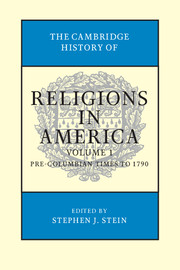Book contents
- Frontmatter
- Contents
- Contributors
- Editor's Introduction
- SECTION I BACKGROUND ON RELIGIOUS TRADITIONS – PRE-1500S
- SECTION II RELIGIONS IN THE POST-COLUMBIAN NEW WORLD – 1500–1680S
- SECTION III RELIGIOUS PATTERNS IN COLONIAL AMERICA – 1680S–1730S
- SECTION IV RELIGIOUS DIVERSITY IN BRITISH AMERICA – 1730S–1790
- SECTION V AMERICAN RELIGIONS IN THE EIGHTEENTH-CENTURY INTERNATIONAL CONTEXT
- 26 Religion and Imperial Conflict
- 27 Evangelical Awakenings in the Atlantic Community
- 28 Religion and the American Revolution
- 29 The Religious Landscape: From the Revolution to the New Nation
- 30 Religion in Canada, 1759–1815
- 31 From Religious Nationalism to Political Consciousness: The Bourbon Reforms in Spanish America, 1750–1790
- SECTION VI THEMATIC ESSAYS
- Index
- References
28 - Religion and the American Revolution
from SECTION V - AMERICAN RELIGIONS IN THE EIGHTEENTH-CENTURY INTERNATIONAL CONTEXT
Published online by Cambridge University Press: 28 July 2012
- Frontmatter
- Contents
- Contributors
- Editor's Introduction
- SECTION I BACKGROUND ON RELIGIOUS TRADITIONS – PRE-1500S
- SECTION II RELIGIONS IN THE POST-COLUMBIAN NEW WORLD – 1500–1680S
- SECTION III RELIGIOUS PATTERNS IN COLONIAL AMERICA – 1680S–1730S
- SECTION IV RELIGIOUS DIVERSITY IN BRITISH AMERICA – 1730S–1790
- SECTION V AMERICAN RELIGIONS IN THE EIGHTEENTH-CENTURY INTERNATIONAL CONTEXT
- 26 Religion and Imperial Conflict
- 27 Evangelical Awakenings in the Atlantic Community
- 28 Religion and the American Revolution
- 29 The Religious Landscape: From the Revolution to the New Nation
- 30 Religion in Canada, 1759–1815
- 31 From Religious Nationalism to Political Consciousness: The Bourbon Reforms in Spanish America, 1750–1790
- SECTION VI THEMATIC ESSAYS
- Index
- References
Summary
Religion played only a supporting role in the American Revolution. As the new republic's founding documents attest, secular matters were paramount. The Declaration of Independence sets forth a rationale for revolution that closely follows John Locke's liberal conception of the relationship between the governed and the government, and it includes a long list of grievances against George III for his alleged violation of the colonists' constitutional rights. The offenses listed relate to such issues as taxation, representation, standing armies, and markets; they do not include religious issues.
Similarly, the U.S. Constitution is a secular document with scant mention of religion. Records of the Federal Convention that deliberated in Philadelphia for four months in 1787 include only a smattering of religious language. The name of Jesus or Christ does not appear at all, and the framers invoked the name of God just twelve times. Even then several of the phrases were such popular expressions as “Good God, Sir …” and “God knows how many more …” rather than reverent invocations of the deity's name. The Constitution itself contains only one reference to religion and that a negative one: “no religious Test shall ever be required as a Qualification to any Office or public Trust under the United States.” The Constitution granted no power whatever to Congress pertaining to religion. Although applied only to the federal government, the removal of religion from government jurisdiction soon led the states to adopt similar measures.
- Type
- Chapter
- Information
- The Cambridge History of Religions in America , pp. 570 - 587Publisher: Cambridge University PressPrint publication year: 2000



